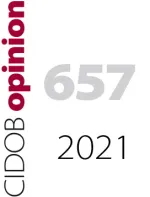Post-Brexit UK has not ‘taken back’ control of immigration

Brexit happened, and a new EU-UK agreement entered into force at the beginning of 2021. But migration is mostly absent from the text. Does it mean that the UK has ‘taken back’ control of immigration, as the ‘Leave’ campaign had promised? A careful analysis shows this is not the case. On the contrary, the lack of cooperation with the EU on migration creates a dangerous situation to manage migration flows.
‘We have to, in this campaign, make people understand that EU membership and uncontrolled immigration are synonymous with each other,’ declared UKIP leader Nigel Farage on 29 April 2016. As the new EU-UK agreement has entered into force on 1 January 2021, it is time to evaluate whether the UK has gained more control of immigration by leaving the EU.
Before Brexit, the UK was not part of the Schengen area and British authorities already controlled passengers crossing their borders. With Brexit, there have been two changes: first, the UK’s withdrawal from the EU agreements on third-country immigration and, second, the end of EU citizens’ freedom to reside and work in the UK.
From July 2014 to June 2015, the non-EU net migration in the UK was positive by 163,000. Four years later, it had increased by 37.5 per cent to 224,000. Brexit does not mean more, but less control of this rising inflow for three reasons. First, as the UK has exited Dublin cooperation, it can no longer return irregular asylum seekers who had transited through the EU.
Second, the UK has lost a stable framework to cooperate with the EU on migration in the Mediterranean. In the House of Commons in 2016, British Secretary of State for Defence Michael Fallon recognised the UK’s ‘very strong interest in trying to curb illegal migration from the African littoral into Europe’. The reason is that a sizeable proportion of these migrants are trying to reach the UK. Therefore, the UK’s withdrawal from the missions to stem this inflow may result in more irregular immigration.
Third, the UK was among the most active Europol members and now keeps only distant cooperation with this EU agency that combats immigrant smuggling. The UK has lost its seat on Europol’s management board, and British officers can no longer interrogate the Europol database. Less cooperation will impair British efforts to dismantle immigrant smuggling networks.
Indeed, with Brexit, the UK has achieved more control of the inflow of EU citizens. However, this inflow had been plummeting. Between July 2014 and June 2015, net migration from the EU to the UK was positive by 212,000–with central and eastern European migrants accounting for 60 per cent (125,000). Four years later, the total had shrunk to 48,000 – with the share of central and eastern European migrants down to about 40 per cent (21,000).
A reason for the large inflow in previous years was that the UK had been the first EU country to recognise the free movement of people from new EU members in central and eastern Europe on 1 May 2004, whereas Germany kept restrictions until 2011. Today, Germany is an attractive destination for migrants from central and eastern Europe. Their net migration in that country rose from 60,000 in 2006 to 150,000 in 2016. Another factor explaining the decline in EU immigration to the UK has been a steady increase in living standards across central and eastern Europe. The Polish GDP per capita has reached 40 per cent of the British one – up from 12.5 per cent in 2003.
Meanwhile, more control of flows from the EU has come at an excessive cost for the UK. Britons have lost their free movement rights and the related opportunities to reside, study, work or provide services in Europe.
In short, it is dubious that Brexit has offered back control of immigration to the UK. The British government has achieved, at an excessive cost, more control of declining inflows from EU countries, but it has lost access to useful EU instruments to control rising inflows from third countries. As the UK had played a leading role in developing the EU instruments to control third-country immigration, one could have expected the UK to keep a close relationship with the EU.
It is not just a missed opportunity, but a dangerous situation. In the next months and years, the EU and the UK will face the challenge of managing their migratory interdependence without a framework. It is an illusion to believe that frequent diplomatic contacts will suffice, or that bilateral channels can compensate for the lack of a European agreement. Unilateral deportation attempts and unwillingness to cooperate in complicated cases may escalate into a crisis.
It matters now to design a comprehensive framework to manage migration flows between the EU and the UK to prevent serious international clashes. This framework may resemble the previous cooperation the UK was part of as an EU member. It may include some return of the UK in the Dublin system and new British contributions to EU missions in the Mediterranean, EU programmes with third countries of origin or transit, and the Europol budget. Only by cooperating with the EU can the UK keep control of immigration.
Keywords: UK, Brexit, EU, migration, Leave, Europol, Dublin cooperation, inflow, Mediterranean
This project has received funding from the European Union’s Horizon 2020 research and innovation programme under grant agreement No 822622. It reflects the author’s view, the EC and its Agency are not responsible for any use that may be made of the information it contains.
E-ISSN: 2014-0843